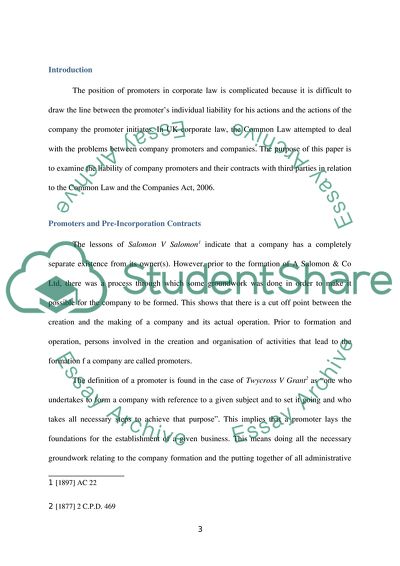Cite this document
(“The common law prior to the Companies Act 2006 did little to solve the Essay”, n.d.)
The common law prior to the Companies Act 2006 did little to solve the Essay. Retrieved from https://studentshare.org/law/1682365-the-common-law-prior-to-the-companies-act-2006-did-little-to-solve-the-various-problems-that-arose-between-the-promoters-of-a-company-and-third-parties-whilst-the-company-was-in-the-process-of-being-incorporated-that-is-until-the-company-concerned-recei
The common law prior to the Companies Act 2006 did little to solve the Essay. Retrieved from https://studentshare.org/law/1682365-the-common-law-prior-to-the-companies-act-2006-did-little-to-solve-the-various-problems-that-arose-between-the-promoters-of-a-company-and-third-parties-whilst-the-company-was-in-the-process-of-being-incorporated-that-is-until-the-company-concerned-recei
(The Common Law Prior to the Companies Act 2006 Did Little to Solve the Essay)
The Common Law Prior to the Companies Act 2006 Did Little to Solve the Essay. https://studentshare.org/law/1682365-the-common-law-prior-to-the-companies-act-2006-did-little-to-solve-the-various-problems-that-arose-between-the-promoters-of-a-company-and-third-parties-whilst-the-company-was-in-the-process-of-being-incorporated-that-is-until-the-company-concerned-recei.
The Common Law Prior to the Companies Act 2006 Did Little to Solve the Essay. https://studentshare.org/law/1682365-the-common-law-prior-to-the-companies-act-2006-did-little-to-solve-the-various-problems-that-arose-between-the-promoters-of-a-company-and-third-parties-whilst-the-company-was-in-the-process-of-being-incorporated-that-is-until-the-company-concerned-recei.
“The Common Law Prior to the Companies Act 2006 Did Little to Solve the Essay”, n.d. https://studentshare.org/law/1682365-the-common-law-prior-to-the-companies-act-2006-did-little-to-solve-the-various-problems-that-arose-between-the-promoters-of-a-company-and-third-parties-whilst-the-company-was-in-the-process-of-being-incorporated-that-is-until-the-company-concerned-recei.


